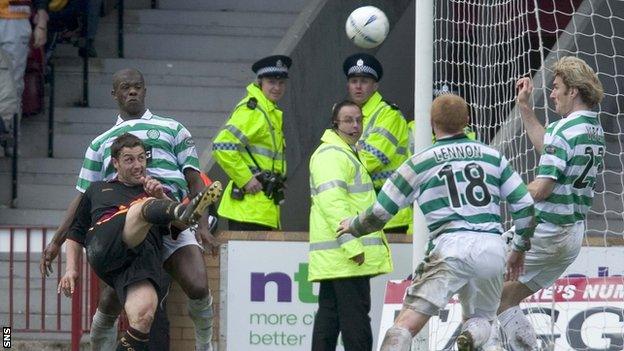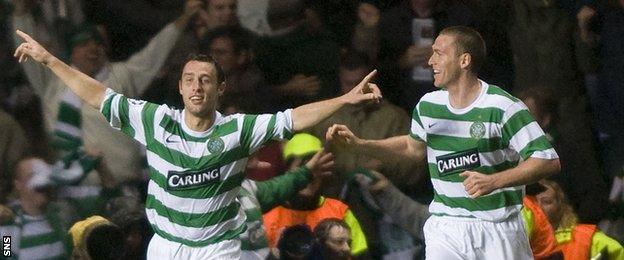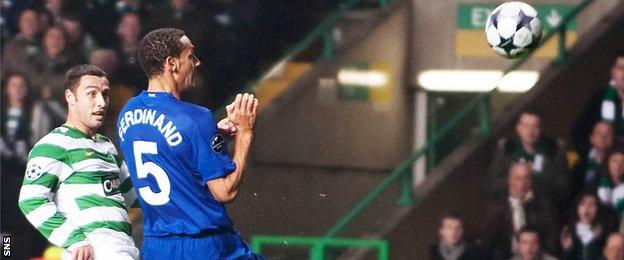Helicopter Sunday: Scott McDonald looks back on his career in Scotland
- Published

Scott McDonald scored two late goals against Celtic to hand the title to Rangers on the last day of the season
Scott McDonald pitched up in Scotland in the winter of 2004 looking for a club and a means to kick-start a career that had stalled south of the border.
He had moved to England from his native Australia in 2000 to join Southampton but didn't make the grade, with loan spells at Huddersfield and Bournemouth, and a move to Wimbledon, proving similarly fruitless.
The striker's switch to Motherwell, however, was the making of him. McDonald not only carved out a fine career for himself, he has left an indelible mark on our game and become part of Scottish football folklore.
A last-minute Champions League winner against holders AC Milan, external for Celtic is a clear highlight, as was his opener in a 1-1 draw with Manchester United, external in Europe's premier competition.
But McDonald will always be most remembered for his role at Motherwell in May 2005, when his late double against Celtic, external secured a 2-1 win and handed the title to Rangers in the most dramatic fashion.
That day, known as Helicopter Sunday, was the start of it all.
"If it wasn't for that infamous day for me then I don't necessarily think I'd be sitting here talking to you about what a good career I've actually had," McDonald told BBC Radio Scotland's Sportsound.

McDonald's goal secured a 2-1 Champions League triumph for Celtic over AC Milan
"I think it gave me the platform and put an attention around me.
"I'll never forget that day. You could feel the tension building within the game at 1-0. Celtic were fully on top, dominating, missed chance after chance."
For a player who had grown up a Celtic fan, emotions were mixed in the aftermath of that day at Fir Park.
"I was in shock after the game," McDonald said. "I thought I was going to get lynched. I remember sitting there in tears after the game.
'My father-in-law didn't look at me for about a week'
"All I can remember is Phil O'Donnell coming up to me, ripping the towel off my head and saying 'stuff them, it's about us, it's about you doing well for you'. Coming from a guy like that, who had played for Celtic, that was huge for me.
"I supported Celtic. It's kind of crazy.
"My grandfather was in the Celtic supporters' club in Melbourne in the early hours of the morning. It's safe to say he had to get bodyguards to get out of there in the end.
"My father-in-law didn't look at me for about a week."
And immediate family weren't the only people with opinions about McDonald's role that day.
"A couple of players have said a few things from their end and I think to myself, 'don't worry about what I did that day'," he added. "Have a look at yourself and look at the chances you missed.
"Don't look at what I did and how I celebrated and when I went to Celtic have comments about, I shouldn't have done this, shouldn't have done this.

McDonald scored a delightful lob against Manchester United
"It's annoying. I was trying to make a career. Instead of criticising me, have a look at yourself."
In a wide-ranging interview, to be broadcast on BBC Sportsound on Saturday, McDonald offers a unique insight into his career.
He talks about Motherwell, the club he has recently left following a second spell, and insists they should not have sacked Mark McGhee earlier this season.
He also talks openly about his strained relationship with the former Celtic manager Tony Mowbray, with whom he ended up working again at Middlesbrough.
And, perhaps most eye-catching, is his claim that a referee once called him a cheat during a game for Celtic.
"I couldn't believe it," McDonald said. "I was in shock when it happened.
'I absolutely lost the plot with him'
"I was backing in and he's (an opponent) left his knee right in the back of my spine. I remember lying there and the referee over me, more or less saying to me 'get up.'
"So I got up and he said 'you're nothing but a cheat'. I absolutely lost the plot with him. In the end I had to get taken off. I'd gone.
"I explained to Gordon (Strachan, then Celtic manager) and Lee Naylor (team-mate) was there as well so he had heard it. The manager certainly sorted it out.
"He went in after the game and spoke to that referee and more or less told him if he didn't apologise to me and sort it out, we'd be going to the FA and others and getting it sorted.
"He apologised but obviously after that, with that certain referee, it was never going to be ok. If you have a run-in sometimes it can get personal. You're only human and you can understand that.
Scott McDonald recalls the shock of a referee telling him he was a cheat
"To say that a referee is completely innocent all the time and calls it straight down and doesn't know what they're doing; I know I'm questioning integrity a little bit, but come on, it happens."
McDonald's immediate future is unclear but the 33-year-old plans to continue playing with an eye on moving abroad.
No matter what McDonald does next, he will have to go some to eclipse the way in which he changed the course of a Scottish top-flight campaign 12 years ago.
Scott McDonald's interview with Kenny MacIntyre will be broadcast on Sportsound on BBC Radio Scotland from 14:00 this Saturday.